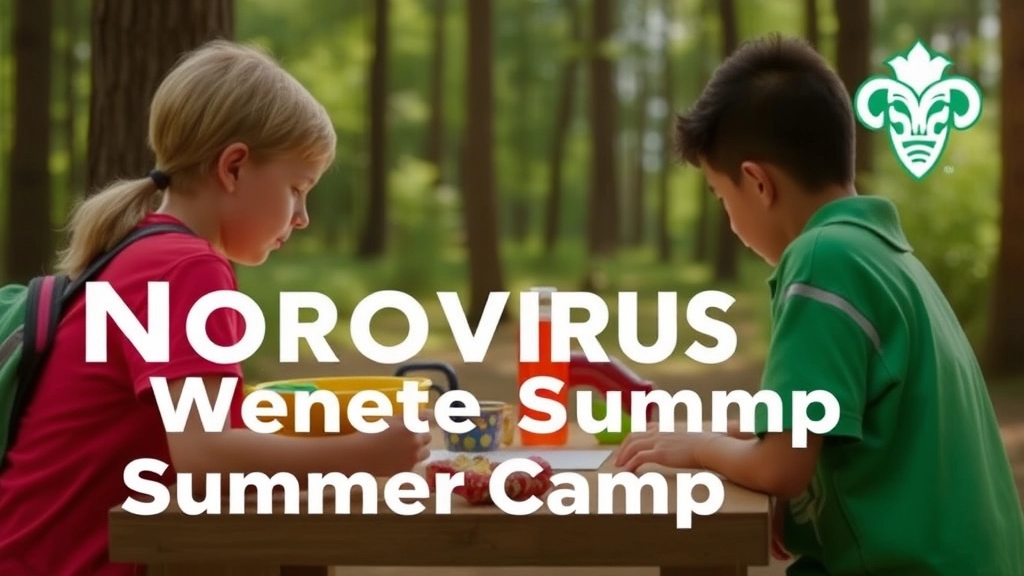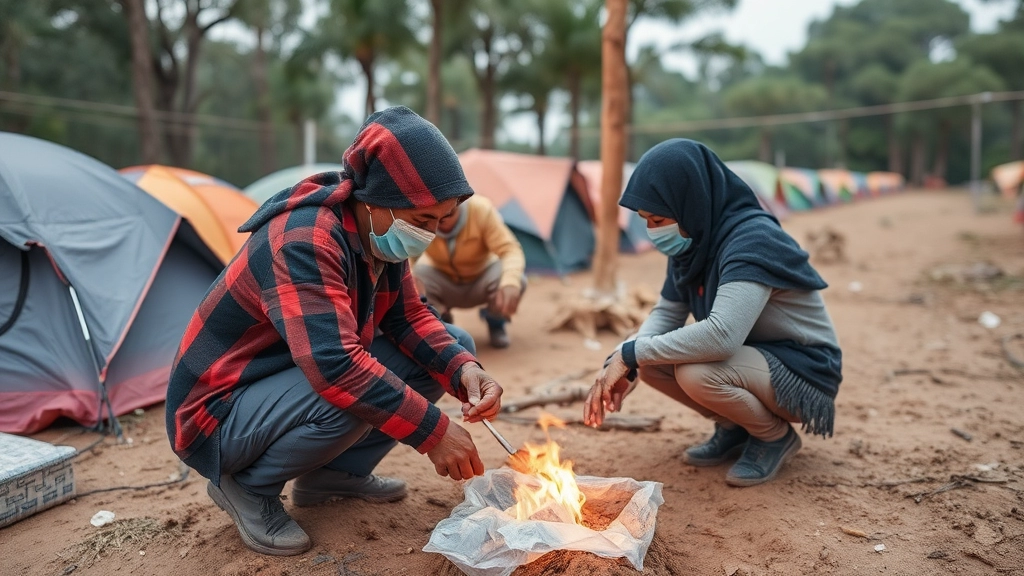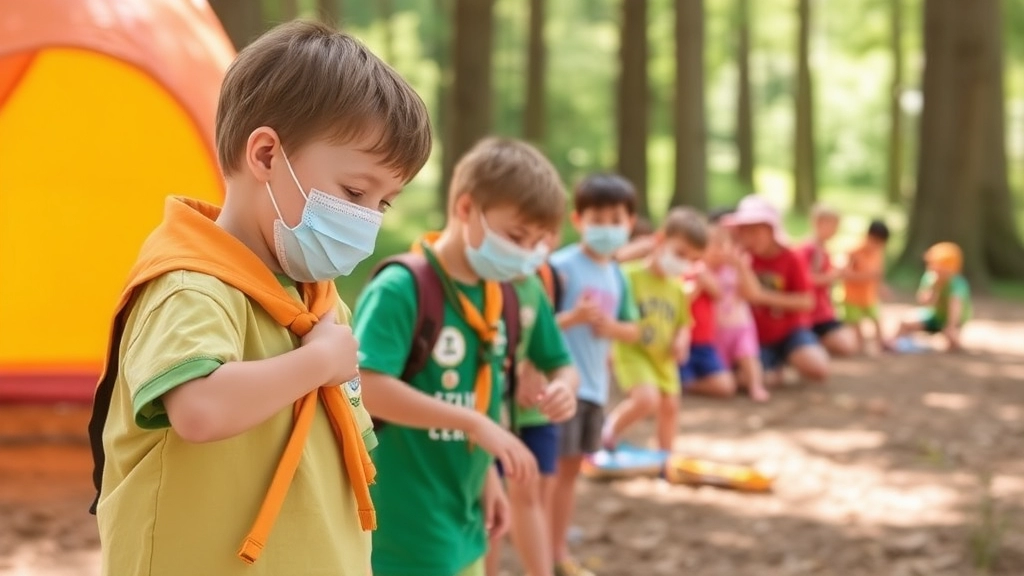Norovirus Outbreak at Wente Scout Summer Camp
At Wente Scout Summer Camp, the excitement of summer adventures took an unexpected turn with a norovirus outbreak. This article delves into the challenges faced by the camp, the symptoms and transmission of the virus, and the urgent measures implemented to manage the situation. Our goal is to provide a comprehensive guide on preventing and responding to norovirus outbreaks, ensuring the safety and well-being of campers.
Challenges and Responses
From the initial impact to the recovery phase, we explore effective strategies for isolating infected individuals, maintaining hygiene, and communicating transparently with parents. By understanding the nature of norovirus and taking proactive steps, camps can safeguard their environments.
Key Strategies for Camp Management
- Isolate infected individuals
- Maintain hygiene
- Transparent communication with parents
Join us as we navigate the complexities of managing norovirus in a camp setting and learn valuable lessons for future preparedness.
Overview of Norovirus Outbreaks in Camps
Alright, let’s dive right in. Norovirus. Ever heard of it? If you’ve ever had a stomach bug that made you wish you could curl up and disappear, you might’ve met this nasty little virus. It’s the stuff of nightmares for camp directors and parents alike. Imagine this: your kid’s all excited for a week of fun at summer camp, but instead, they come home sick as a dog. Not cool, right?
So, what’s the deal with norovirus in camps? Let’s break it down.
What is Norovirus?
Norovirus is a highly contagious virus causing gastroenteritis, which is a fancy term for inflammation of the stomach and intestines. The symptoms? Think vomiting, diarrhoea, stomach cramps â basically, your worst day after a bad meal, multiplied by ten.
Why Camps are a Hotspot
Camps are like a petri dish for norovirus. Why? Because you’ve got a bunch of kids in close quarters, sharing bathrooms, meals, and activities. It’s basically a virus’s dream vacation spot.
Here’s why camps are particularly vulnerable:
- Close living conditions: Kids bunk together, eat together, and play together. One sick camper can easily spread the virus to others.
- Shared facilities: Bathrooms, dining halls, and recreational areas are communal. This makes it super easy for the virus to spread.
- Limited hygiene: Let’s be real, kids aren’t exactly known for their stellar hygiene practices. Hand-washing can be hit or miss, especially when they’re busy having fun.
Real Concerns
Parents worry about sending their kids to camp and having them come back sick. Camp directors worry about managing an outbreak and keeping everyone safe. And let’s not forget the campers â they just want to have a good time without getting sick.
So, what can be done?
We’ll get into all the nitty-gritty details of symptoms, transmission, and, most importantly, how to prevent and manage outbreaks in the sections to come. But for now, just know that understanding the basics of norovirus and why camps are hotspots is the first step in keeping everyone healthy.
For more information on selecting a camp that prioritizes health and safety, check out our guide on finding the perfect fit for your child. Additionally, learn about the importance of hygiene and safety in camps by visiting our article on fun activities and safe environments at Abess Summer Camp.
Impact of Norovirus on Wente Scout Summer Camp

Ever wondered how a norovirus outbreak can turn a fun summer camp into a nightmare?
It’s a real concern for parents and camp organisers alike.
At Wente Scout Summer Camp, we faced this head-on.
How did Norovirus hit us?
Imagine a camp filled with excited scouts, ready for adventure.
Then, out of nowhere, kids start getting sick.
It spreads like wildfire.
Norovirus doesn’t mess around.
What’s the fallout?
- Activities grind to a halt.
- Campers are isolated.
- Staff scramble to manage the chaos.
Why is it a big deal?
- Health Risks: Kids are vulnerable.
- Camp Experience: Disrupted for everyone.
- Reputation: Takes a hit.
Real Talk:
We had to act fast.
Here’s what we learned:
- Swift Isolation: Keep the sick away from the healthy.
- Sanitation Overdrive: Clean everything. Twice.
- Communication: Keep parents in the loop.
Lessons for the Future:
- Preparedness: Have a plan before it hits.
- Education: Teach scouts and staff about hygiene.
- Resources: Stock up on supplies.
Facing a norovirus outbreak isn’t just about managing the immediate crisis.
It’s about ensuring Wente Scout Summer Camp remains a safe, fun place for future adventurers.
Implementing Preventative Measures in Camps

Worried about a norovirus outbreak at your camp? You’re not alone. Preventing this nasty bug from ruining everyone’s fun is a top priority. Let’s dive into some practical steps to keep norovirus at bay.
Start with Cleanliness
First off, cleanliness is king. You can’t skimp on this.
- Handwashing: Everyone needs to wash their hands. A lot. Use soap and water, and scrub for at least 20 seconds. Hand sanitiser is good, but it doesn’t beat good old-fashioned soap and water.
- Surface Cleaning: Disinfect surfaces frequently. Think dining tables, doorknobs, and bathroom fixtures. Use a bleach-based cleaner for best results.
- Food Safety: Ensure all food is cooked thoroughly and stored properly. Raw or undercooked food is a big no-no.
Educate and Inform
Knowledge is power. Make sure everyone knows what they’re dealing with.
- Training: Train your staff on norovirus symptoms and transmission. They should be able to spot the signs and act fast.
- Posters and Flyers: Put up informational posters around the camp. Simple, clear instructions can go a long way.
- Daily Briefings: Quick daily reminders about hygiene practices can keep everyone on their toes.
Monitor Health
Keep an eye out for symptoms. Early detection can stop an outbreak in its tracks.
- Health Checks: Regularly check campers and staff for symptoms like vomiting, diarrhoea, and stomach cramps.
- Isolation: If someone shows symptoms, isolate them immediately. Have a plan in place for this.
Encourage Good Habits
Good habits are the backbone of prevention.
- Hydration: Encourage everyone to drink plenty of water. Staying hydrated helps the body fight off infections.
- Rest: Make sure everyone gets enough sleep. A well-rested body is better at fighting off viruses.
- No Sharing: Remind campers not to share personal items like water bottles, towels, or utensils.
Real Stories, Real Lessons
Remember that time at Wente Scout Summer Camp when a quick response stopped a potential outbreak? They had hygiene stations everywhere and staff trained to spot symptoms early. It worked like a charm.
In a nutshell, keeping norovirus out of your camp isn’t rocket science. It’s about being proactive, staying clean, and educating everyone involved. Follow these steps, and you’ll be well on your way to a healthy, happy camp experience.
Effective Response and Management Strategies for Norovirus Outbreaks
Worried about handling a norovirus outbreak at your camp? You’re not alone. Many camp directors and staff share the same concerns. Let’s break down some practical, no-nonsense strategies to tackle this head-on.
Immediate Action Steps
When norovirus hits, quick action is crucial. Here’s what you need to do right away:
- Isolate Infected Individuals: Keep those showing symptoms away from others to prevent the virus from spreading.
- Clean and Disinfect: Use bleach-based cleaners to wipe down all common areas, bathrooms, and any surfaces the infected individuals may have touched.
- Notify Health Authorities: Get in touch with local health departments to report the outbreak and seek guidance.
Communication is Key
Transparency is everything. Parents and guardians need to know what’s going on. Here’s how to handle it:
- Send Regular Updates: Keep parents informed through emails or texts. Let them know the steps you’re taking to manage the situation.
- Provide Clear Instructions: If a camper needs to be picked up, give explicit instructions on what parents should do to minimise further spread.
Keeping the Camp Running
You don’t want the whole camp to come to a standstill. Here’s how to maintain operations while managing the outbreak:
- Modify Activities: Shift to outdoor activities where the virus is less likely to spread.
- Stagger Meal Times: Reduce the number of campers in the dining hall at any one time to limit contact.
- Increase Hygiene Stations: Place hand sanitiser and handwashing stations throughout the camp.
Long-Term Management
Once the immediate crisis is under control, focus on preventing future outbreaks:
- Training and Education: Make sure all staff are trained in hygiene practices and know the signs of norovirus.
- Health Screenings: Implement regular health checks for campers and staff.
- Review and Improve Protocols: After the outbreak, evaluate what worked and what didn’t. Update your emergency plans accordingly.
Real-Life Example
At Wente Scout Summer Camp, a norovirus outbreak once hit hard. The camp director immediately isolated affected scouts, ramped up cleaning efforts, and communicated transparently with parents. By modifying activities and increasing hygiene measures, the camp managed to contain the virus and continue operations with minimal disruption.
For more tips on maintaining a safe and enjoyable camp experience, check out our guide on Summer Camping Top Tips & Gear Essentials. If you’re looking for a camp that prioritizes safety and fun, consider ZKids Summer Camp.
Communicating with Parents and Guardians

Alright, let’s get real for a second. Your kid’s at camp, and there’s a norovirus outbreak. What now?
Parents and guardians are freaking out, and you need to keep them in the loop. Here’s how to do it without causing a panic.
Why Communication Matters
First off, transparency is key. Parents need to know what’s happening, how you’re handling it, and what steps you’re taking to keep their kids safe.
Immediate Notifications
As soon as you detect an outbreak, send out an immediate notification. Use all channels—email, text, and even social media.
What to Include in the Notification:
- Current Situation: Be clear about the outbreak.
- Symptoms to Watch For: Help parents identify if their kid might be affected.
- Steps You’re Taking: Outline your action plan to control the outbreak.
- What Parents Should Do: Give them clear instructions on any actions they need to take.
Regular Updates
Don’t just send one message and call it a day. Keep parents updated regularly. A daily update via email or a dedicated webpage can go a long way.
FAQs Section
Create a FAQ section on your website. Answer common questions like:
- How is norovirus transmitted?
- What are the symptoms?
- How long will the camp be under quarantine?
Hotline for Urgent Queries
Set up a hotline. Parents will have questions, and a hotline ensures they get answers fast.
Personal Stories
Share real stories. If a camper recovered quickly, share that. It reassures parents that things can get better.
Keep It Real
Don’t sugarcoat it. Parents appreciate honesty more than a polished PR statement.
Key Takeaways
- Transparency: Keep parents in the loop.
- Immediate Action: Notify them as soon as an outbreak is detected.
- Regular Updates: Keep the information flowing.
- Answer Questions: FAQs and hotlines are your friends.
- Honesty: Be real, not polished.
Ensuring Safe Recovery and Future Precautions
Alright, let’s talk about something crucial: safe recovery and future precautions after a Norovirus outbreak at camp.
You’ve just dealt with a Norovirus outbreak. What now? How do we make sure everyone recovers safely and we prevent this from happening again?
First off, recovery.
Here’s what you need to know:
- Hydration is Key: Make sure everyone drinks plenty of fluids. Norovirus causes dehydration. Water, oral rehydration solutions, and clear broths are your best friends here.
- Rest Up: Encourage plenty of rest. The body needs time to heal.
- Nutrition: Gradually reintroduce food. Start with bland items like toast, rice, and bananas.
Now, how do we make sure this doesn’t happen again?
Future Precautions:
- Clean, Clean, Clean: Disinfect surfaces regularly. Norovirus can live on surfaces for days.
- Hand Hygiene: Encourage frequent and proper hand washing. Use soap and water, not just hand sanitisers.
- Isolate When Necessary: If someone’s sick, keep them away from others. Isolation is crucial to prevent spread.
- Educate Everyone: Teach campers and staff about the symptoms and transmission methods of Norovirus. Knowledge is power.
Communicate:
- With Parents & Guardians: Keep them in the loop. Let them know what’s happening, what steps you’re taking, and how they can help.
- With Campers: Make sure they understand the importance of hygiene and what to do if they feel sick.
Real Talk:
Imagine you’re at camp, having a blast, then bam! Norovirus hits. It’s a nightmare, right? We’ve got to be proactive. Think of it like preparing for a storm. You wouldn’t wait until it’s raining to fix the roof. Same deal here.
Pro Tips:
- Regular Training: Hold regular training sessions for staff on handling outbreaks.
- Emergency Kits: Have emergency kits ready with rehydration solutions, cleaning supplies, and isolation gear.
- Review Policies: Regularly review and update camp health policies.
For more information on ensuring a fun and safe camp experience, check out our guide on Abess Summer Camp. Additionally, learn from our Charter Bus Tips for a Perfect Summer Camp Trip to ensure smooth logistics and safety measures.
FAQs on Norovirus at Wente Scout Summer Camp
What is norovirus and how does it impact camps like Wente Scout Summer Camp?
Norovirus is a highly contagious virus that can cause severe gastrointestinal symptoms. At camps, it can quickly spread among campers and staff, disrupting activities and necessitating immediate action.
How did the norovirus outbreak begin at Wente Scout Summer Camp?
The outbreak started unexpectedly, with campers suddenly falling ill. It spread rapidly, requiring swift management to contain it.
What measures were taken to control the outbreak?
Key measures included isolating sick individuals, enhancing sanitation efforts, and maintaining open communication with parents to keep them informed.
Why is an outbreak of norovirus such a big deal in a camp setting?
An outbreak poses health risks to campers, disrupts the camp experience, and can damage the camp’s reputation if not handled properly.
What lessons were learned from the outbreak at Wente Scout Summer Camp?
The camp learned the importance of preparedness, hygiene education, and having adequate resources on hand to manage such situations effectively.
How can camps prevent future norovirus outbreaks?
Preventative measures include rigorous cleanliness, educating staff and campers on hygiene, regular health monitoring, and encouraging good habits like proper hydration and rest.
How should camps communicate with parents during a norovirus outbreak?
Transparency is crucial. Camps should provide immediate notifications, regular updates, and maintain a FAQ section to address common concerns. Setting up a hotline for urgent queries is also recommended.
What should parents do if their child is at a camp experiencing a norovirus outbreak?
Parents should stay informed through the camp’s updates, watch for symptoms in their child, and follow any instructions provided by the camp authorities.
References
- Norovirus | CDC
- Norovirus – WHO
- Norovirus – Symptoms and causes – Mayo Clinic

